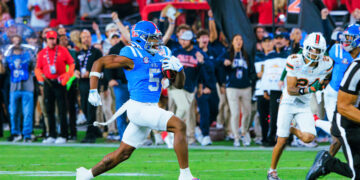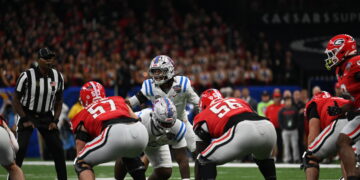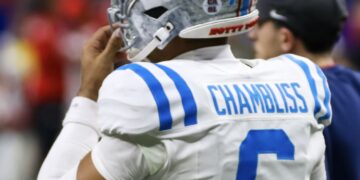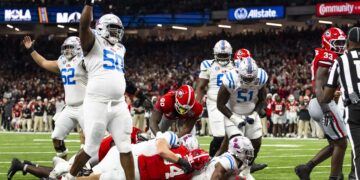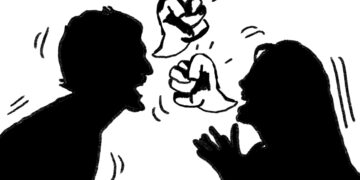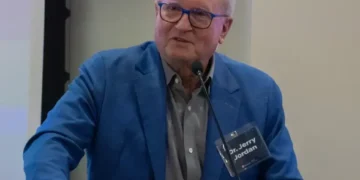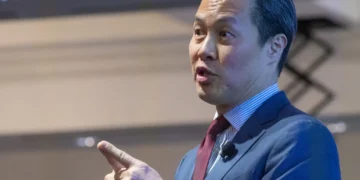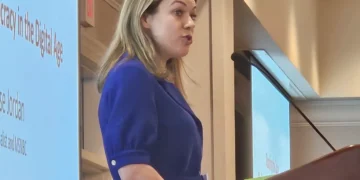
Photo courtesy: Kade Giles
Decked out in red and blue and holding those ubiquitous Solo cups, tens of thousands of people poured into the Grove to watch the Ole Miss Rebels play their first SEC game of the year against the Kentucky Wildcats on Sept. 28.
Most fans were sure of a win, but they were not so sure they liked the way the game has changed in the era of transfer portals and name, image and likeness (NIL) deals.
Kade Giles, a junior sports and recreation administration major, was one of those fans in the Grove before the game.
“I think it’s essentially turning college sports into pro sports,” Giles, an Ocean Springs, Miss., native, said. “It has just turned into which booster club can throw the most money at players, and I don’t think that’s good for college athletics.”
The introduction of NIL deals has brought both excitement and chaos to big-time college sports. It marked a significant shift in the way athletes can monetize their personal brands, allowing them to benefit financially from their skills and popularity.
For years, the debate about whether college athletes should be compensated raged, with many people calling for reform. When the National Collegiate Athletic Association (NCAA) approved its NIL rules in 2021, the move was mostly hailed as a positive change.
“It’s probably overdue that players get paid for their likenesses when you think about how much money a student athlete makes for a program like Alabama, Texas or USC or how much money Jaxson Dart makes for Ole Miss,” Michael Katz, Ole Miss Athletics reporter for the Northeast Mississippi Daily Journal, said.

Photo courtesy: Michael Katz
However, Katz said, after three years college athletics programs are still grappling with the consequences of the decision.
“I don’t think there’s enough overarching governance,” Katz said.
The initial launch of NIL deals, which promised to strengthen athletes financially, has morphed into a complex scenario that few anticipated.
“They got this ready to go because they knew that it was time to, and then they sort of let it all out of the bag without realizing maybe they hadn’t thought everything through all the way,” Katz said.
The rush to launch the NIL system left significant gaps in oversight creating an environment ripe for dissatisfaction, confusion and controversy, Katz said. Now three years into the NIL era, athletes, schools and sponsors are finding ways to adapt to a system that continues to evolve without clear guidelines.
“It’s hard to go back and sort of undo things or change things, because it’s been going on for three, four years now,” Katz said.
The lack of comprehensive regulations has led to stories of unmet promises, contract disputes and a growing sense of unpredictability in how deals are structured and enforced.
“You just get these messy situations where it’s a lot of he said, she said. Every day is something new and some crazy story about someone who says they weren’t getting the money that they wanted, and then the other side says, ‘Well, actually this person asked for more money and they breached the contract.’”
One way Ole Miss has responded to the new college sports environment is through the formation of The Grove Collective. The NIL collective, designed to support Ole Miss student-athletes, has become an integral part of the university’s strategy to remain competitive in an era when NIL deals can significantly influence recruiting and player retention.
By providing athletes with sponsorships, promotional deals and other financial opportunities, The Grove Collective ensures that Ole Miss can offer its athletes a way to maximize their earnings while representing the school.
Katz acknowledged that inequality has always been a potential consequence of NIL.
“The schools that can generate the most money are getting the best players,” Katz said.

The chart displays NCAA revenue-sharing estimates in millions for SEC schools in the 2025-26 fiscal year**, highlighting three key components for each school: The green bar indicates how much money the schools are expected to allocate to athletes in revenue sharing. (The cap is $21 million, and Ole Miss and Mississippi State are the only SEC schools that are not expected to reach that cap.) The orange bar shows how much money the schools would have available to allocate for athlete revenue-sharing (up to 22% of total revenue) if they were allowed to exceed the $21 million cap. The blue bar is the estimated total revenue for each school. **Vanderbilt data not availiable.
The Grove Collective has helped Ole Miss build a competitive football roster that might not have been possible in the past, according to Katz.
“Without NIL, is Ole Miss a top 10 team, a top five team, College Football Playoff favorite? Probably not.”
Fans do want to win, of course, but NIL has changed the way some view the athletes. Jack Rose came to Ole Miss from Mahomet, Ill., to major in sports and recreation administration. At the Grove for the Kentucky game, Rose said he now feels less connected to individuals on the team.
“It’s more like some of the players just want to go for the money, which sucks, but I mean that’s life,” Rose said.
While NIL has dramatically changed athlete recruitment and compensation, it is not the only factor transforming college sports. Katz notes that the rise of the transfer portal in 2018 is closely linked to the NIL era, as players now have the ability to move schools not just for playing time, but also for better financial deals. Ole Miss Football Head Coach Lane Kiffin gets credit for the way he works the transfer portal, and Katz said that is a critical skill.
“If you don’t embrace the transfer portal, you’re done. You’re cooked. You are not going to be able to field an elite team anymore.”
Kade Giles, a junior from Ocean Springs, Miss., and an Ole Miss fan, said thanks to NIL and the transfer portal all of college football has changed.
“You have to view the athletes more as free agents at the end of every year, not as people that have signed to play for four years,” he said. “Your favorite college team is almost professional now.”
Ole Miss fan and Illinois native Jackson White is a junior majoring in business management. He thinks NIL rules need to change.
“There should be more fairness to the NIL and how things are regulated, how much people can pay to have players and how much money they can just throw out there,” White said.
Former Ole Miss baseball pitcher and current Biloxi High School Baseball Coach Hawtin Buchanan was tailgating in the Grove for the Kentucky game, too. He said NIL and the transfer portal affect not just players and fans but coaches as well.
“I hope this doesn’t happen, but I think the one thing you may see is just shorter coaching tenures at certain universities,” Buchanan said.
He adds that when NIL money gets involved, expectations for immediate results can escalate quickly.
“When somebody is giving money to a program to try to see the football team win or try to see the basketball or baseball team win, if that team’s not winning, they’re going to say, ‘Why am I donating money if this coach is not winning games or things like that?’”
Former Ole Miss basketball player Marshall Henderson had a lot to say about NIL and the transfer portal as well.
“I think that players should be paid. My reasoning first though was from when I played and it wasn’t off of being a college athlete or off your performance and how you do. For me, it was the fact that you’re in the public eye and there’s people always out there trying to bring you down and especially that being the media,” Henderson said.
Henderson, known for his fiery personality on and off the court, emphasized that beyond performance, the pressures of public scrutiny play a significant role in why athletes deserve compensation.
“People do some of the craziest stuff and with the media having access to things and the ability to try and bring you down when something positive is going on,” Henderson said. “Just to have everything out there for anyone to find and take advantage of, and then there’s the athlete – you’re not allowed to do anything about it and you can’t respond. For me, that alone is why college athletes should get paid.”
Henderson, who has also had experience as a coach at the community college level, shares Buchanan’s view on the pressures that NIL and the transfer portal place on coaches.
“You know, I think what Coach (Mike) Gundy said at Oklahoma State was he was tired of people calling him after the season had already started, asking for more money,” Henderson said. “He’s like, ‘Hey, we’ve negotiated things, we have contracts, and now we’re playing the season.’ Issues during the season from outside the locker room, like requests for more playing time or money, are going to be more frequent. There’s going to be more outside influence coming in about these problems, and that’s probably tougher for college coaches now compared to previous years.”
Buchanan fears the impact will eventually find its way into high school locker rooms.
“There’s just the thought in the back of high school coaches’ minds that now with NIL being a factor, what if some of these boosters putting together NIL deals for a kid heading to a Division I school start offering money early, under the table, to keep that kid interested or ensure he doesn’t jump into the transfer portal after a year,” Buchanan said. “If that happens, it could ruin the high school kid’s eligibility. If they’re promised a certain amount of money and they start accepting it while still in high school, it could cost them their eligibility and potentially sideline them for their senior year. For some schools, that’s their best player, and losing them could have a huge impact.”
Former Ole Miss football linebacker Dwayne Nesmith, who played for the Rebels from 1980 to 1984, also has mixed emotions about the changes in college sports.
“I think it’s very good that college athletes are able to get compensated for their ability and the work they put in,” Nesmith said. “But I wish there was a process in place where everyone on the team gets compensated fairly because those stars aren’t able to put on those performances without everyone else involved.”
Nesmith, who now works in the software and professional services industry, said more needs to be done.
“The compensation is significantly skewed toward those star athletes,” Nesmith said. “It does appear that some of the critical components of putting that entertainment on the field, some of the people involved in that, are not being compensated in what would be considered a fair compensation model. If you were to put this together from the ground up as a professional sports league, I think you would compensate those people higher.”
Reflecting on how NIL and the transfer portal would have impacted his own career, Nesmith said, “It would have changed the composition of the team on an annual basis quite significantly. Some of my friends might have left, and I wouldn’t have the relationships I have today.”
It’s those relationships among the athletes, the fans and their teams that may be changed or even lost forever in an era of NIL and transfer portals. And as the fans who watched Kentucky end the Rebels four-game winning streak will tell you, losing is never easy.













